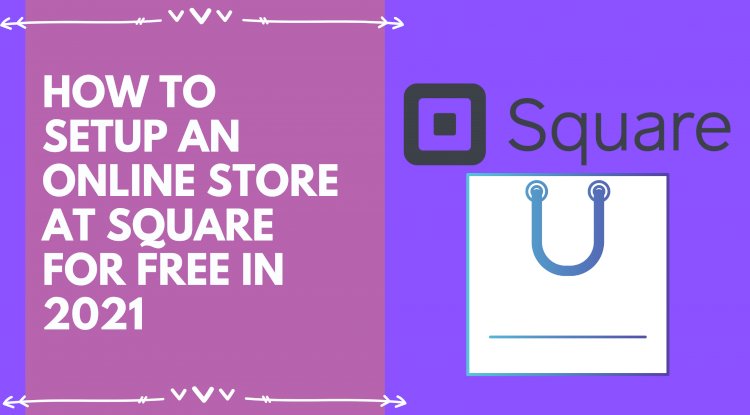7+ Mistakes to Avoid while Blogging for an E-Commerce
Blogging for e-commerce sites is quite different and follows a different process. In the quest of doing it right, people make some mistakes while blogging for e-commerce. Avoid these mistakes while Blogging for Ecommerce.

As an e-commerce company, the mission is to attract as much targeted traffic as possible to your website. Most of which can convert into paying customers. You can start by pursuing paying traffic, which can pull in immediate traffic. However, this would necessitate a large budget, and you must get it right. Otherwise, you risk blowing the whole budget without seeing any results. E-commerce blogging, on the other hand, is completely accessible.
Without costing a dime, it will assist you in embracing organic, tailored, and transforming traffic. While it takes some time to see results, once you do, they are constant, and a blog will assist you in obtaining a large number of them. However, there are a few blunders to refrain from while blogging about E-commerce.
But during the course of my journey, while going through many e-commerce sites, I have noticed a few mistakes that people make, either while blogging for an e-commerce site or guest blogging for different sites for backlinks which undermines their brand and is unable to bring in any organic traffic and often leads to no sales as well.
I have seen many brands with hundreds and thousands of backlinks, and ranking keywords but with not-so-good content there is an almost negligible sale on their e-commerce sites.
I would like to discuss the points especially made by the e-commerce platforms and marketers and how can they get it right while doing so.
Let’s begin!
Following are 7+ Mistakes to avoid while blogging for e-commerce-
1. Not knowing the real purpose and Going Off-Niche
Most of the time what happens while blogging, businesses forget their main idea which is of course selling the product. They just randomly post blogs that would be linked to just their ‘industry’ or ‘product’ and not directly to themselves.
For example, if suppose you sell printed artworks, even though the artworks are made from acrylic or oil paints you cannot go on with citing the reasons which paint is better, this is like going way too broad, and the fact that you don’t even deal in the selling the paints, you sell paintings!
What would happen is, people interested solely in this topic would come to your blog, read the information, and go, and no one would even bother to check out your products!
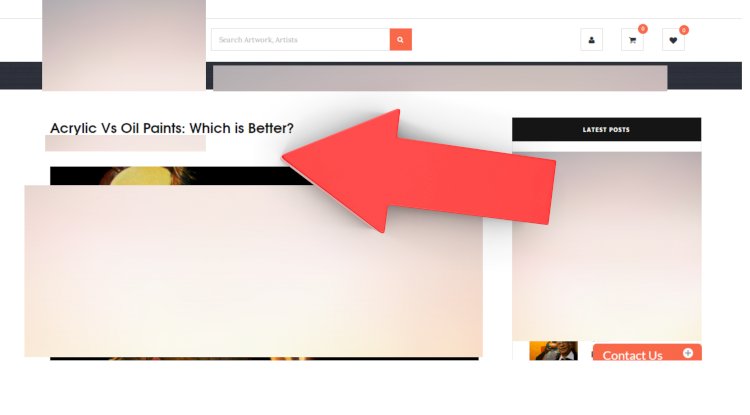
And this is a common e-commerce blog error, which is getting too big a subject matter, which can happen if you don't obey any of the simplest blogging guidelines. The aim of your blog, which is to push targeted traffic to product sites, is defeated if it lacks reach.
It's important to be concise to remain inside the niche in which your product falls. For example, if you sell mattresses, you should focus your blogging on sleeping, mattress shopping, pillow selection, duvets, and other related topics. You can demonstrate your experience as an authority on the subject.
Amerisleep mattress could sell their product and was able to increase their conversions by 13.9% which is more than a million dollars in turnover for a year. The company was able to attract a lot of visitors to its site but was unable to make any sales.
It changed its course a little and increased its checkout by introducing the following changes.
On its Blog page rather than explaining the features of its product, it started to add and delete certain information which changed the entire map of the company. It started associating general problems which people face and then linking to its product which stated how its mattresses’ can help them tackle that problem.
They went a little wider from their spectrum by not just saying “Get a Good Night’s Sleep” but explaining “How to get Good Night’s Sleep”
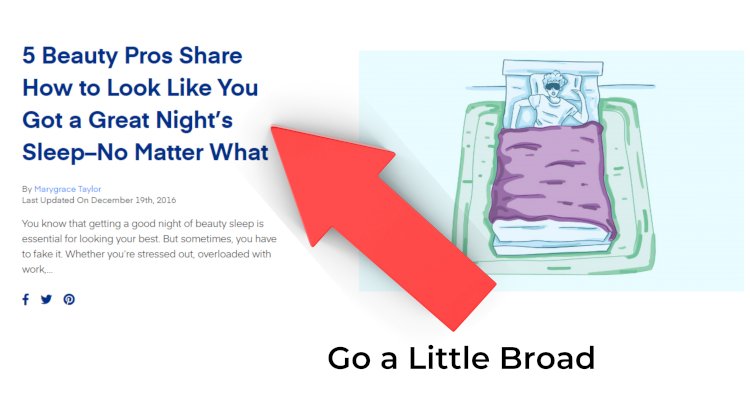
2. Not Implementing Persuasive Content Writing Techniques
Your blog section is the only place to provide value to your readers by sharing useful knowledge. Beginner bloggers are prone to writing sales copy in the title of their posts. However, you won't add value to your content if you do so, and it's also not advised from an SEO standpoint.
Google will penalize your site if you write promotional material and promote it in the name. E-A-T (Expertise, Authoritativeness, and Trustability) is a ranking factor used by Google for websites. It is particularly true for YMYL (Your Money Your Life) websites that cover medical, financial, and legal topics. As a result, you must ensure that you are writing content after conducting extensive research on a given subject.
However, text copy that consists solely of information does not appeal to the majority of readers. As a result, you must be certain that the content is indeed enjoyable. The AIDA law should be followed when writing an entertaining and compelling piece of material. It's a recipe for ads that loosely corresponds to A-Attention, I-Interest, D-Desire, and A-Action.
As a result, the material must first be able to pique the audience's interest with an appealing headline. Then, your material introduction can pique the attention and persuade users to continue reading. The content body should be able to pique the reader's interest in purchasing your offering. In addition, the conclusion should have a simple call-to-action (CTA) for the reader to follow.
If you stick to the AIDA maxim, you'll be able to create entertaining and engaging content that converts your readers into customers. It's also critical that you use a consistent content structure for your blog. The long sentence should be broken up into short paragraphs. All the lists should be numbered, followed by several subheadings, videos, and graphics should be used wherever possible.
Now the second tactic that Amerisleep opted for was not just that articles related to their products which was somehow related to the positive impact it had on their lives, but they also invited a ‘Call-to-action’ to their product pages, which is very crucial!
Otherwise, they wouldn’t have able to increase their sales manifolds.
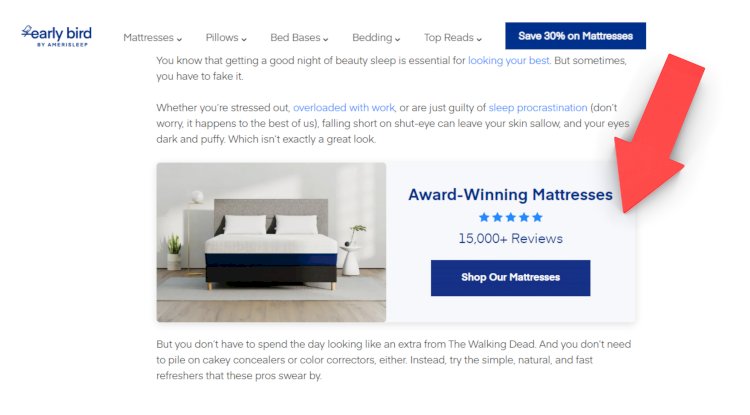
3. Forgetting to prioritize to Bring Traffic!
It isn't going to be a huge hit right away. If you aren't dedicated in the long run, it will manifest in your blog's content. You will have struggled to fulfill your original objective of beginning a blog. What's the result? Many of your efforts have been in vain. You will excel if you follow industry best practices, but it will not be as quickly as you would like.
You can't just put up random 5-10 blog posts and call it a day. It would be best if you were consistent to excel in blogging along with keeping in mind that you need the traffic to your blogs especially when you are just starting out with your e-commerce business.
Building a popular e-commerce brand takes time, and the same is true for blogging.
There is another example of Mojarto an online art-selling platform that is quite punctual in posting its blogs and has been able to generate a lot of traffic to its site as well!

Along with that, the main purpose of blogging for your e-commerce business is that you also need traffic before sales! That’s why it’s equally important to not just focus on other marketing tactics but also on your blogs.
I still recommend to people that with more effort in your blogs you can make more money than spending it on highly un-relevant Social media ads, especially when you are just starting out.
This is an example of IndiGalleria, an online art gallery that ranks for its blogs too. This helps the site bring in the most traffic along with increasing its sales.
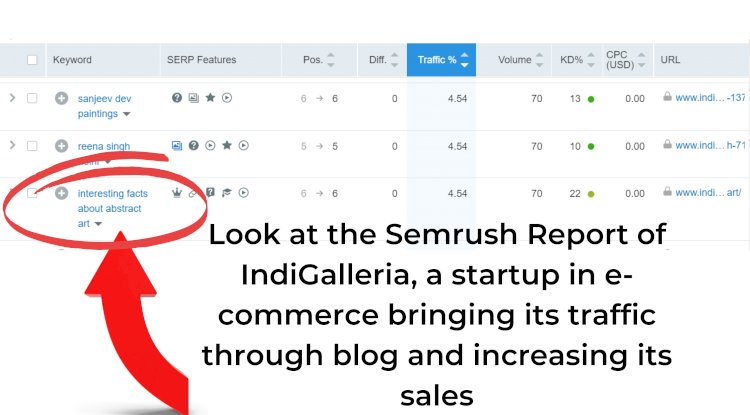
The person should be clear about their objectives and therefore think of bringing traffic through blogs too, which is not only important in the early stages of your business but also when you are already settled in the market because the thing with e-commerce is that it can go away anytime with new e-commerce businesses rising each day, which causes you to be more consistent.
4. Talking only about your brand
You own your blog and have complete freedom to write anything you want. However, if you wish to have value for your followers and build a loyal following, you must blog on important topics.
For people starting with e-commerce businesses working in the digital world, it’s imperative for them to show their standing in the market and that leads to a little bragging.
Your public is unconcerned with the blog's editor, nor are they interested in the fact that you employ celebrities. Make your blog a platform for publicity rather than a soap opera. Customers who come to your site looking for answers to their questions are looking for answers, not a post about your successes.
It's fine to mention your merchandise in certain posts if they're necessary. But, in the end, you want your blog to be a stage in your buyer's path that takes them to your product site. It is where you may put all of your sales gimmicks to the test.
Even if you wish to show your success or any achievement which would instill trust in your market customers then the best way is to humbly do it. Which is also known as “Humble Bragging”.
You can make the Title of the Blog a little Humble or maybe an inspirational one so that people take it in a positive way rather than thinking of your brand and people as snobs. Change your Topic from “We Were Chosen as the Best Company by So and so” to “How we were able to Prove Ourselves”
Doing this will help your brand gain trust as well as save your image from being tagged as ‘Snobbish’ by not doing it in the wrong way.
Take an example here, Instead of writing “Professor Niren Sen Gupta associated with us for an Event” can be changed to “Professor Niren Sen Gupta was the Guest of Honor for the Online Art Exhibition”

Now another case here, of Zomato, a Big Brand offering online food delivery, here they are solely talking about their brand. However, since Zomato is already a Brand and has many customers already, it need not worry about traffic and awareness, because it has reached that stage already. So you don’t need to copy big brands by just talking about your brand, and even the need be go the suggested way.
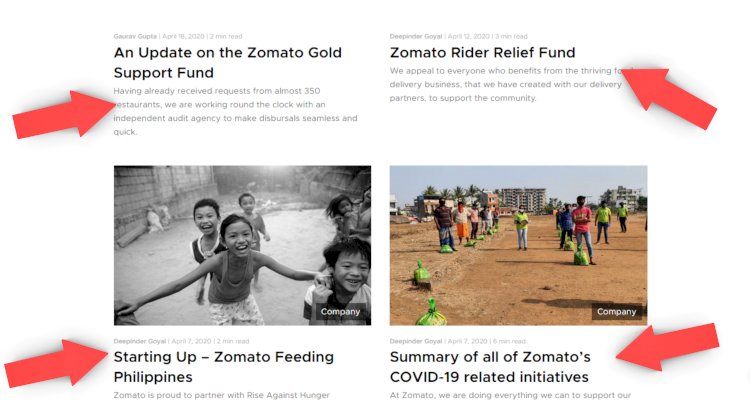
5. Letting blog outrank the product pages
It is a challenge that many e-commerce shop owners face. For certain search keywords, the blog outranks the product sites, confusing users as they arrive at the blog. As one would expect, the click-through rate would be low, potentially causing the page to drop in the rankings. If you're having trouble with this, the first step is to assess the problem and determine what's causing it. If the problem is with referencing, indexing, or content, it is simple to fix.
Another scenario is that the blog's rating power overwhelms the product page's ability to rate. It would be smarter to place the blog on a subdomain in this situation. It is a very common phenomenon among e-commerce behemoths. As a result, instead of the blog overshadowing the e-commerce side of things, you have two opportunities to score with the keywords.
HubSpot for example publishes many blogs, almost every day, which is not the issue, the issue arises that too many of its blogs rank on certain keywords.
They tackled this problem by having their blogs on a different sub-domain. Its main site is hubspot.com while its blogs are published on blogs.hubspot.com.
Subdomains are seen by Google and other search engines as different websites. This means that search engines must crawl and index each subdomain separately.
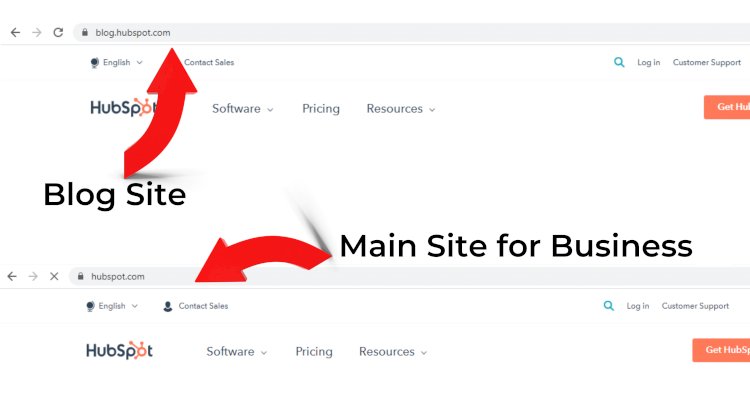
This means that now you can also rank for your Blogs while linking back to your main site along with not dominating your product pages. This is the most ideal way of dealing with such issues.
6. Poor Design
Bad architecture makes a blog sound like an afterthought rather than anything else. Although many e-commerce sites have invested heavily in their home pages, the typography and architecture are out of sync with the rest of the platform when you go to the blog.
Even though they are part of a large e-commerce company website, blogs often seem to have been thrown together in a panic. Followed by difficult-to-read fonts and confounding formats.
Many times people consider the easy-to-read fonts and formats but forget the easy readability for the users.
You should also keep in mind the eye span of a person, which is not very wide, hence keeping the blog's content less wide would mean more readability for the readers.
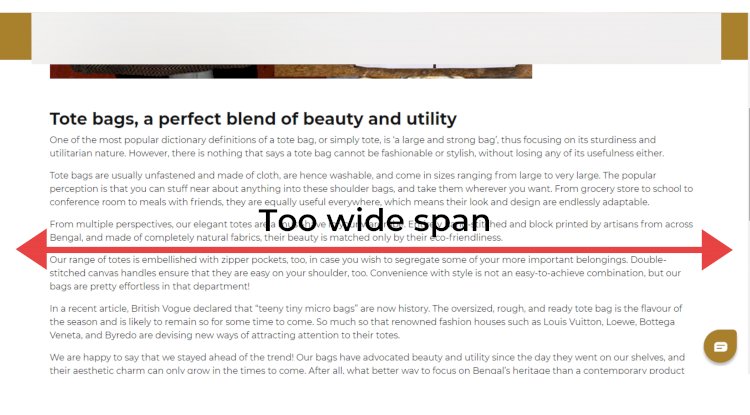
7. Focusing too much on SEO
SEO is important for increasing the content's online exposure. However, if you put SEO ahead of user experience, you could end up with subpar content. Conducting keyword research is the first step in writing SEO material. It assists you in identifying words or phrases that could use in your content to improve its online exposure.
Though keyword analysis is essential for novice bloggers, you should not do it exclusively for SEO purposes. Instead, it would help if you used it to learn what your target audience is searching for online. It will assist you with writing blog posts that discuss the issues that your target audience is facing.
Following Google's latest algorithm improvements, the search engine currently places a greater emphasis on the meaning of the content when determining its SEO importance. As a result, if you would like your content to be widely read and respected, you should prioritize writing well-researched, high-quality posts.
Does this mean that I shouldn’t rank for my products?
It’s not like you don’t have to focus at all. But all of your articles shouldn’t be solely posted for the purpose of ranking. Instead, something useful should be shared.
For example, The Bengal store here has many blogs which do not rank, nor are written for that purpose. They link their blog posts to their product description and also share the blogs on social media, which would first engage interested readers and then it would also convince them to buy it. This effort needs to be made, also because you are there to help your site by engaging the customers.
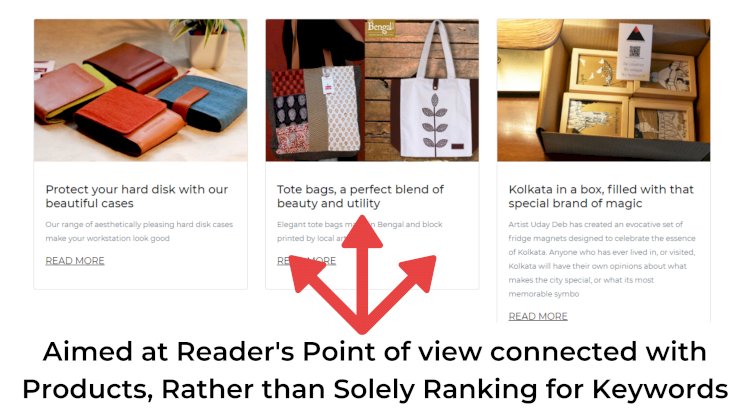
8. Not Considering Social Media Traffic as “Buyers”
Mostly it is thought that social media visitors won’t be buyers and posting too much content would sway them away from your site, and ultimately reduce your following. But that’s not true, posting in a personalized way, and really useful blogs would always attract those readers who would either buy your products or are genuinely interested in your products/brand/article. What matters are the people clicking on the link and landing on your site!
As important as it is to publish new posts regularly to be respected as an authoritative figure in your field, it is vital to spread your content online to expand its scope. To maximize your blog posts' exposure, promote them on social media sites such as Facebook, Twitter, Instagram, and LinkedIn.
Every E-commerce blogger should advertise their content on social media for people to find them. It would help you if you did not skip the chance to get your blog posts to the attention of your target customers in an extremely competitive environment. Because hundreds of other companies are generating as much profit as possible.
Hubspot is able to generate 112.2k visitors to its blog from social media. Which is less as compared to its total visitors but not to mention that the number of visitors is still significant enough to make your website’s traffic and sales. Even if you get only a thousand visitors from social media, you will know they are really dedicated people who truly wish to know more about your brand and maybe even purchase your products later on, after all, buying comes after the trust is built up.
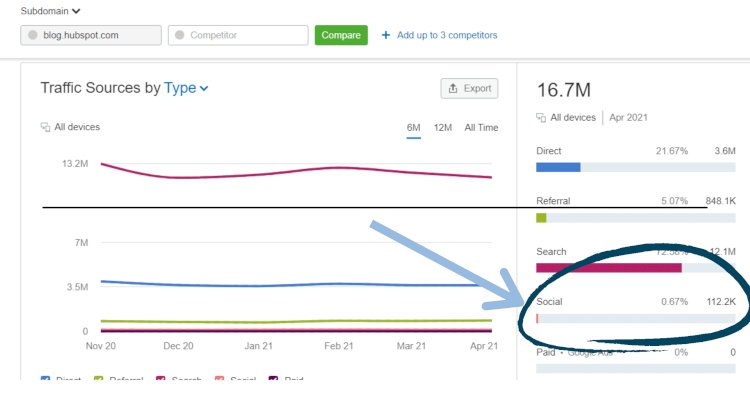
And not to forget, something is better than nothing.
You'll quickly fall behind in the global market if you concentrate on producing high-quality content and not finding opportunities to sell it. And if your blog posts get sufficient traffic, you can promote them online because your overall objective is to generate as many leads as possible.
Final words
Your blog acts as a two-way dialogue in which you can get input from your clients. It also provides positive criticism and open comments, which you can use to enhance the product and brand's consumer service. The more you write, the more leads you'll receive, including email signups, quotation requests, and, most significantly, sales.
A blog also aids in the ranking of long-tail keywords and cryptic, less popular keyword phrases. You won't likely score for high-converting keyword phrases if you don't have a blog.
If you continue to add material that could serve as tools to your blog, you can build natural ties with columnists, writers, and bloggers. Remember that connections are beneficial to SEO, but they may also pull in good referral traffic.








